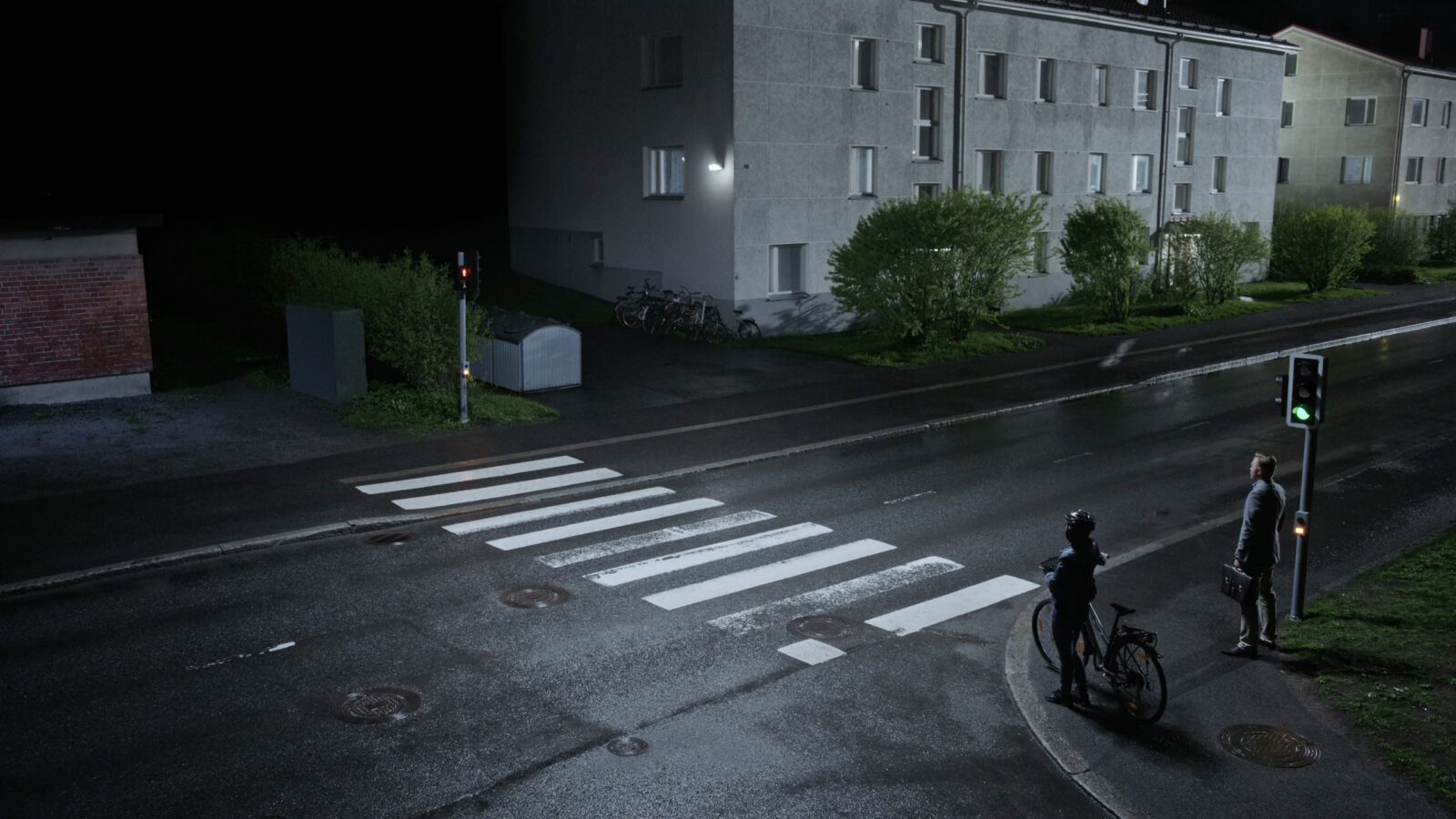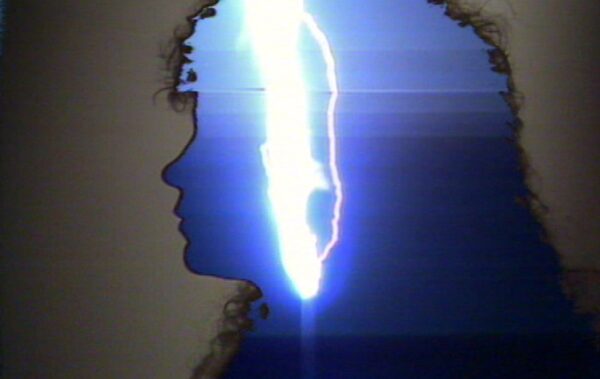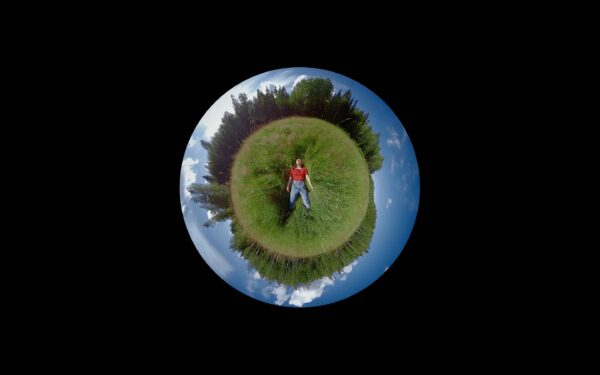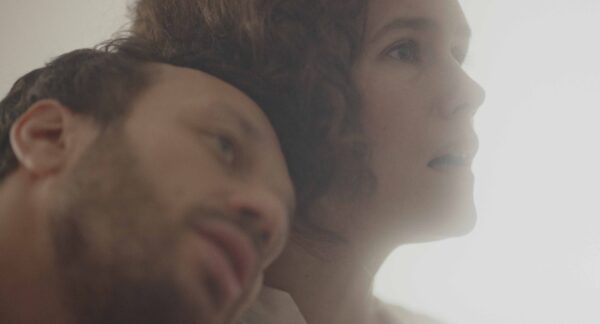Cracks In The Pavement
The Human Torch
There is something in these characters that writer-director Risto-Pekka Blom feels compelled to denounce and it soon becomes evident who his real targets are.

A few months ago, while strolling through a quiet neighborhood, I witnessed a mother standing on the side of a deserted intersection, rigorously teaching her kid not to jaywalk. The child, well-behaved, listened closely. As she was emphasizing how important it is for pedestrians to abide by traffic laws “at all times”, even when there is no one around, a man suddenly appeared and, unaware of the stakes at play, innocently jaywalked right in front of them. A betrayed look could be seen on the poor mother’s face. The interesting part is that I was about to jaywalk too, as I do it all the time at that specific intersection, without the slightest afterthought. But hearing this woman trying to ease the confusion out of her kid’s eyes while salvaging the moral of her teaching, I hesitated and froze. Ultimately, I decided to wait, too, for the light to turn green, on a completely empty street, pondering the meaning of my paralysis. I strangely felt exposed, red-handed by my hesitation, as if my core values were unveiled in a way, in the face of a child.
This little story happened in my hometown, thousands of miles away from Finland where The Human Torch, the latest short film by writer-director Risto-Pekka Blom, is set. Yet, it depicts an eerily similar scenario, like a distant echo to this memory of mine, alluding to the universality of its themes: self-governance and social duress.
The five-minute film consists of a single fixed shot, elevated over a street like a security camera, filming a pedestrian crossing at night. While an anonymous voice is heard mysteriously pleading its innocence in regard to various unseen events (“it wasn’t me”), three people arrive at the crossing and patiently wait for the traffic light to turn green. As expected, the stubborn light won’t budge, putting these silent characters in front of the test. The position of the camera doesn’t allow the audience to properly identify the nature of these people, but one can clearly see they are well-dressed, clean-shaven, and respectable, law-abiding citizens. Surely, they will wait, as instructed by social norms. But the longer they do, staying entirely motionless in the dead of the night, the more absurd their actions become in the face of the obvious: there is no judge in the court. Nobody is going to come and punish them if they were to jaywalk here, and they know it.
Why are they insisting on obeying, without showing the slightest hint of hesitation? And why does questioning their motives feel like I’m incriminating myself? Is it me who’s being tested? I sense the same level of exposure here as when I froze on the side of that empty street. Yet, one can’t help but agree that their immobility seems out of place, wrong almost, even if it’s theoretically commendable. And that’s not all. On two occasions, the characters don’t even appear to be disturbed when being openly taunted.
On the most remarkable of these occasions, a black Mad Max-styled Chevy suddenly appears in the shot and brakes in the middle of the crossing. Its engine roars menacingly; its exhausts shoot black smoke on the pavement. Its occupants–symbols of freedom for some, symbols of chaos for others–remain unidentifiable, blasting stereotypically loud punk music behind tickly tinted windows. After a few seconds of stillness, a door opens, and an empty beer can is thrown out on the road as if they were marking their territory, only to disappear out of the shot immediately after. As stated, nobody even flinches. Or, at least, nobody on screen, because the audience surely does. In that regard, credit has to be given to the simplicity of Blom’s mise en scène, which is, by far, the film’s strongest feature. The camera’s fixed voyeuristic position has the unique ability to transform these characters into unknown avatars of some sort, meant to be embodied by the audience itself. It’s the gap between what one would’ve done in the characters’ situation and what they actually do (or don’t) that creates a lasting emotional response to the former.
Evidently, the answers we are left seeking, as to why these nameless citizens act as diligently as they do, were never really meant to be displayed by the filmmaker. In fact, as the viewing advances, it becomes arguable that they are not even the focal point of this film. Perhaps, we are. One could say their existence is only made relevant by the fact that we are observing them. It doesn’t matter if they jaywalk or not, it matters how we perceive their actions, and how the tension created by that perception makes us feel. They are not being taunted; we are. It’s as if we were commanded to reconsider the nature of our own morals by comparing them to theirs. Is this who we are? Who we should be? Are we as pure and good-hearted as we were led to believe?
This shifted focus is further emphasised by the male anonymous voice we are granted to hear sporadically. As mentioned, it initially appears as pleading innocence about events that are not displayed on screen. By doing so, it inevitably links them to the mundane situation at play in front of the camera, which, the audience soon learns, makes the viewing quite unsettling to watch. “It wasn’t me,” the voice says, “‘who crossed the border in the dark, under a false name, unauthorized, […], not knowing the language, so arrogant.” And it keeps on going: “It wasn’t me […] protesting again […], a human torch in the evening news, so hungry for attention.” As condescending as the voice sounds, one finds itself unable to fully distance from it because the voice also claims to be part of “the humble, quiet one,” unambiguously mirroring the law-abiding characters that are portrayed on screen and by extension, the audience.
Ultimately, these divisive confessions are all lectured with an increasingly explicit goal in mind: condemning events that are threatening social stability and acquitting those that are maintaining it in a manner that disturbingly doesn’t beg for forgiveness. The antagonistic preachiness of the voice, combined with the all-too-perfect behavior of the characters on camera, makes the overall picture clearer than ever. There is something in these characters that writer-director Blom feels compelled to denounce, and by leading the audience in embodying them and connecting with them, it becomes even more evident who his real targets are.
Simply put: the world’s gone bad. So much so that common citizens are having more and more trouble finding ways to cope: Refugees crossing borders at night and human torches dying in protests are some of humanity’s most desperate cases. However, in the face of such uncertainty, a slew of toxic resentments has unfortunately emerged, mostly racism, especially in predominantly white countries that are well served by the status quo that is currently being threatened.
In that regard, The Human Torch argues that the main perpetrators of these resentments, the ones that really are to blame, are no other than the silent majority. You and I, the audience, all comfortably wallowed in the darkness of a movie theater. One might be under the impression that one’s life is honorable, especially if shielded by anonymity, but no matter how high one’s social credits are and how self-righteous abiding by traffic laws makes one feel, complicity by apathy appears to be irrefutable. Like the mother and her kids who inadvertently made me reassess the legitimacy of my core values by exposing my desire to jaywalk, Blom does the same here, albeit voluntarily, with the simplest set-up and less than five minutes of runtime. A tour de force to be reckoned with. After being awarded a Special Prize at the Tampere Film Festival and an honorable mention at the Minimalen Short Film Festival earlier this year, it’s now set to be screened at the Norwegian Short Film Festival in Grimstad this week.





There are no comments yet, be the first!